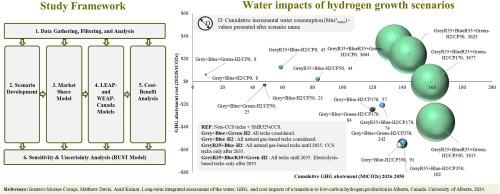Long-term integrated assessment of the water, GHG, and cost impacts of a transition to low-carbon hydrogen production: A case study for Canada
IF 9.7
1区 环境科学与生态学
Q1 ENGINEERING, ENVIRONMENTAL
引用次数: 0
Abstract
Hydrogen-based greenhouse gas (GHG) mitigation strategies can have multi-sector benefits and are considered necessary to reach net-zero emissions by 2050. Assessments of hydrogen scale-up have not included long-term implications for water resources. This work aims to fill this knowledge gap through a long-term integrated assessment of the water consumption, GHG emissions, and costs of conventional and low-carbon hydrogen scenarios to the year 2050. A framework was developed and 120 long-term scenarios were assessed for the large-scale deployment of low-carbon hydrogen in a hydrogen-intensive economy. This study considered 15 different natural gas- and electrolysis-based hydrogen production technologies. A case study for Alberta, a western Canadian province and a fossil fuel-intensive region, was carried out. The results obtained project a cumulative mitigation of 9–162 million tonnes of carbon emissions between 2026 and 2050 through the implementation of low-carbon hydrogen production scenarios compared to the business-as-usual scenario. However, cumulative water consumption increases considerably with the large-scale deployment of low-carbon hydrogen, reaching 8 to 3815 million cubic meters. The adoption of green hydrogen technologies increases water consumption significantly. Depending on the jurisdiction of analysis and its water bodies, this increase may or may not be a long-term issue. Low-carbon hydrogen scenarios start becoming cost-effective as the carbon price rises to $170/tCO2e. The developed integrated framework can be used globally to assess long-term hydrogen implementation with appropriate adjustments in data.


向低碳氢生产过渡对水、温室气体和成本影响的长期综合评估:以加拿大为例
氢基温室气体(GHG)缓解战略可带来多部门效益,并被认为是到2050年实现净零排放的必要条件。对氢气规模扩大的评估没有包括对水资源的长期影响。这项工作旨在通过对到2050年传统和低碳氢情景的水消耗、温室气体排放和成本进行长期综合评估,填补这一知识空白。制定了一个框架,并对120个长期情景进行了评估,以便在氢密集型经济中大规模部署低碳氢。这项研究考虑了15种不同的天然气和电解制氢技术。对加拿大西部省份、化石燃料密集地区艾伯塔省进行了个案研究。所获得的结果预计,与一切照旧情景相比,通过实施低碳制氢情景,2026年至2050年期间将累计减少900万吨至1.62亿吨碳排放。然而,随着低碳氢的大规模部署,累计用水量大幅增加,达到800 - 38.15亿立方米。采用绿色氢技术大大增加了用水量。根据分析的管辖权及其水体,这种增加可能是也可能不是一个长期问题。随着碳价格升至170美元/吨二氧化碳当量,低碳氢方案开始变得具有成本效益。开发的综合框架可在全球范围内用于评估长期氢能实施情况,并对数据进行适当调整。
本文章由计算机程序翻译,如有差异,请以英文原文为准。
求助全文
约1分钟内获得全文
求助全文
来源期刊

Journal of Cleaner Production
环境科学-工程:环境
CiteScore
20.40
自引率
9.00%
发文量
4720
审稿时长
111 days
期刊介绍:
The Journal of Cleaner Production is an international, transdisciplinary journal that addresses and discusses theoretical and practical Cleaner Production, Environmental, and Sustainability issues. It aims to help societies become more sustainable by focusing on the concept of 'Cleaner Production', which aims at preventing waste production and increasing efficiencies in energy, water, resources, and human capital use. The journal serves as a platform for corporations, governments, education institutions, regions, and societies to engage in discussions and research related to Cleaner Production, environmental, and sustainability practices.
 求助内容:
求助内容: 应助结果提醒方式:
应助结果提醒方式:


